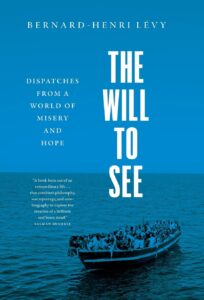
I’ve seen Bernard-Henri Lévy on PBS, Amanpour, and Democracy Now over the last few months, and my middle daughter, who studied in France, gifted me this book. I soon learned that the author is a renowned public intellectual/philosopher who has reported on human rights abuses worldwide for over 50 years.
This book follows the intrepid Lévy into eight international hotspots—Nigeria; Syrian and Iraqi Kurdistan; Ukraine; Somalia; Bangladesh; Lesbos, Greece; Libya; and Afghanistan—that have escaped global attention or active response.
He describes an “inner compass” as motivating him to travel and report on disastrous situations like this, “for indeed, it is this true inner heart whose beating unfailingly sets my mind and body in motion. Indeed, it is at the beckoning of this inner voice that I make my decisions and act on them.”
One of the most gruesome stories relates to “Nigeria’s Christians Are Under Siege.” According to the author, the Fulani are Islamic extremists of a “new stripe” linked to Boko Haram. “The Global Terrorism Index ranked them in 2015, among the four most deadly jihadist movements, right behind ISIS, the Taliban and Boko Haram….”
He goes on to say, “They torch houses. Kill her four children before her eyes. When her turn comes, and they notice she is pregnant, a discussion ensues: some do not want to see her belly slit, so they compromise by cutting up her arm with a machete, like butchers, starting with the fingers, then the hand, then the forearm, then the rest, after the last one of the group complains that he has not had his chance.”
In the Epilogue, the author describes the work of a writer,
And I believe that in a writer, a real one, one who works with his head and his hands, with his intelligence and his lungs, his wisdom and desire, one in whom body and soul contend, clash, and come to terms on a blank page, one who writes as if life and death depend on it, one who throws himself whole-hearted, with all his might, into the books he writes, one who sweats blood and water (and I do not know, when one writes like this, whether he sweats more in, whether he sweats more in doing the things or relating them)-I believe that, in such a writer in that “terrible worker”(Rimbaud again), singular chemistry is at work.
However, you’ll want to keep your dictionary close by while reading this book. The author uses a lot of French and refers to authors and books only the French would know. The author’s English or translation is not flawless, but it’s a timely and worthwhile read.
“This is a book born out of an extraordinary life, much of it spent plunging into the world’s most troubled and crucial places, a life committed to an internationalism that is not owned by the powerful, and to visions of France, Europe, and liberty that can’t be understood by bureaucrats. A passionate, engaged book that combines philosophy, war reportage, and autobiography to explore the creation of a brilliant and brave mind.”—Salman Rushdie
“Call[s] on people not just to see the world, but to be moved and interested by what they find there, and to do something about it.” Anne Applebaum, The Atlantic
About the Author
Bernard-Henri Lévy is a philosopher, filmmaker, activist, and author of over thirty books, including The Virus in the Age of Madness. He is regarded as one of the West’s most important public intellectuals. Often referred to as BHL in France, he led the “Nouveaux Philosophes“ (New Philosophers) movement in 1976. His opinions, political activism, and publications have also been the subject of several controversies over the years.
Product details
- Publisher : Yale University Press (October 26, 2021)
- Language : English
- Hardcover : 208 pages
- ISBN-10 : 0300260555
- ISBN-13 : 978-0274760268
- Item Weight : 15 ounces
- Dimensions : 5 x 0.75 x 8.5 inches
- Best Sellers Rank: #423,991 in Books (See Top 100 in Books)
- #184 in Human Rights Law (Books)
- #381 in Human Rights (Books)
- #973 in Political Commentary & Opinion
About the Reviewer
Walker was a Peace Corps Volunteer in Guatemala and an intern at the Institute of Latin American Studies at the University of Texas in Austin, where he received his master’s degree. He spent over forty years helping disadvantaged people in the developing world with organizations like CARE, MAP, and Make-A-Wish International. His memoir, Different Latitudes: My Life in the Peace Corps and Beyond, his first book, was followed by My Saddest Pleasures: 50 Years on the Road.
He’s a contributing writer for The Authors Show, Revue Magazine, Literary Traveler, and the Wanderlust Journal. His “The Million Mile Walker Review: What We’re Reading and Why” is part of the Arizona Authors Association Newsletter. One of his 28 articles was awarded a “Bronze” by the Solas Literary Award for Best Travel Writing. He founded Million Mile Walker LLC in 2016. His wife and three children were born in Guatemala. He can be found at www.MillionMileWalker.com